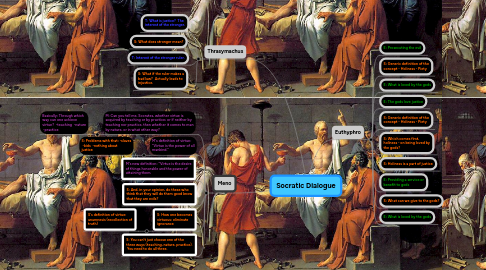Socratic Dialogue
por Cammy Amano


1. Thrasymachus
1.1. T: What is justice? The interest of the stronger.
1.2. S: What does stronger mean?
1.3. T: Interest of the stronger ruler.
1.4. S: What if the ruler makes a bad law? Actually leads to injustice.
2. Meno
2.1. M: Can you tell me, Socrates, whether virtue is acquired by teaching or by practice; or if neither by teaching nor practice, then whether it comes to man by nature, or in what other way?
2.1.1. Basically: Through which way can one achieve virtue? -teaching -nature -practice
2.2. M's definition of virtue: "Virtue is the power of all mankind."
2.2.1. S: Problems with that: -slaves -kids -nothing about justice
2.3. M's new definition: "Virtue is the desire of things honorable and the power of attaining them.
2.4. S: And, in your opinion, do these who think that they will do them good know that they are evils?
2.5. S: How one becomes virtuous: eliminate ignorance
2.5.1. S's definition of virtue: anamnesis (recollection of truth)
